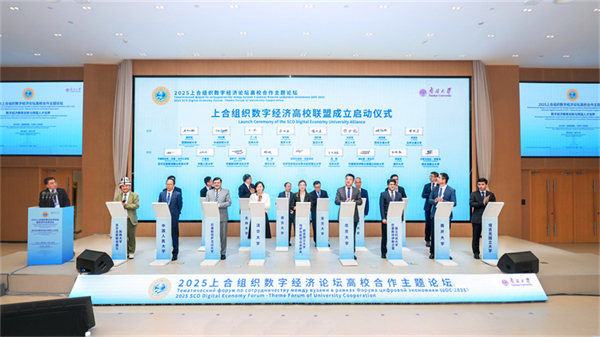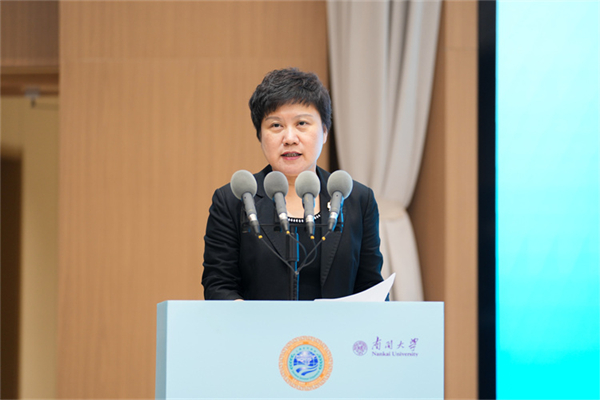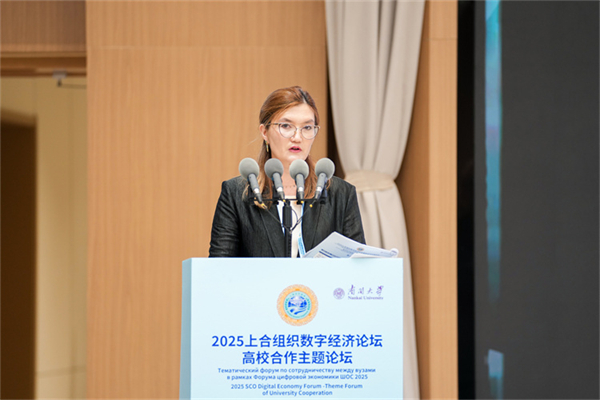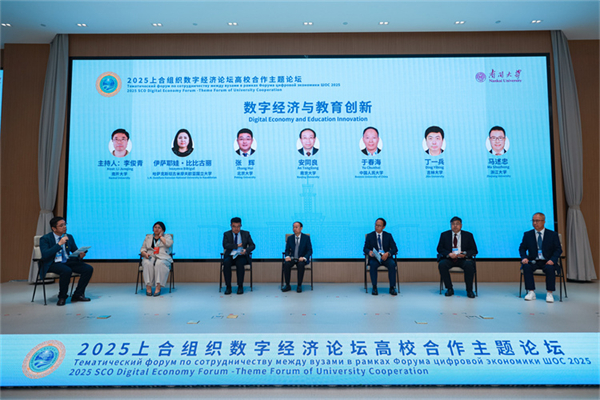
The SCO Digital Economy University Alliance is established. [Photo provided to chinadaily.com.cn]
Chinese and Shanghai Cooperation Organization member universities have jointly launched the SCO Digital Economy University Alliance, aiming to boost cross-border collaboration in digital innovation, talent training, and sustainable development.
The alliance was established last week at Nankai University in Tianjin, where experts emphasized China's willingness to share its digital economy experience to support SCO partners in accelerating their own digital transformations.
"The alliance aims to promote collaborative innovation and sustainable development in the field of digital economy among various universities through interdisciplinary integration, efficient resource integration, and joint talent cultivation, injecting wisdom and vitality into the high-quality development of the global digital economy," said Li Junqing, secretary of the Party Committee of the School of Economics at Nankai University.

Zhang Ling, deputy mayor of Tianjin, delivers a speech at the forum. [Photo provided to chinadaily.com.cn]
Li explained that the digital economy is fundamentally a market-driven process centered around data, encompassing the entire industrial chain of data generation, processing, storage, and application.
According to the Digital China Development Report (2024), the digital economy now contributes over 40 percent to China's GDP, with core digital industries accounting for around 10 percent.
"The entire digital economy industry is driving the country's economic growth," Li said. He highlighted that the development of AI technology and the widespread adoption of 5G have provided explosive growth opportunities.
"Although China started developing its digital economy relatively late, it is not lagging behind globally, mainly due to China's rich application scenarios and comprehensive industrial chain," he said.

Bekmanova Gulmira Tyleuberdievna, vice-rector of L.N. Gumilyov Eurasian National University in Kazakhstan, introduces the university's digital strategy. [Photo provided to chinadaily.com.cn]
Li noted that development levels vary across SCO countries, citing Pakistan's internet usage rate of under 50 percent.
"China plays more of a role in sharing experiences, which positively influences the development of digital economy industries in various countries through the process of sharing and driving," he added.
"The SCO is a mutually beneficial and win-win organization with great potential to promote regional peace, prosperity, and connectivity. I hope that all member countries can continue to deepen educational cooperation and jointly build a talent community for the 'Digital Silk Road'," said Muhammad Zahid Latif, president of the National University of Sciences and Technology in Islamabad, Pakistan.

Several experts from SCO countries engage in a discussion at the forum. [Photo provided to chinadaily.com.cn]
At the opening ceremony, Zhang Ling, deputy mayor of Tianjin, said, "Enhanced exchanges and cooperation in digital economy between domestic and foreign universities are timely and opportune."
Nankai University has already launched joint projects with Kazakhstan's L.N. Gumilyov Eurasian National University, focusing on digital economy and industrial innovation.
Over 140 students have enrolled in related programs in just one month, highlighting surging demand in countries involved in the Belt and Road Initiative.
Nankai University President Chen Yulu said, "Currently, education is undergoing a comprehensive digital transformation intertwined with opportunities and challenges, which places higher demands on deepening cooperation in the education sector among SCO member countries and provides a rare opportunity for enhancing university exchanges and coordinated development among SCO member countries."
Bekmanova Gulmira Tyleuberdievna, vice-rector of L.N. Gumilyov Eurasian National University in Kazakhstan, introduced the university's digital strategy.
She said, "Kazakhstan and China are close partners in education and science and technology. Kazakhstan highly values joint projects such as Luban Workshop and the digital economy education project launched with Nankai University. These collaborations will promote mutual learning and create a better future together."
"The SCO Digital Economy University Alliance still has more room for deeper exploration in the field of digital economy," Li Junqing from Nankai said, suggesting that in the future, other universities specializing in science and technology may join the alliance.



